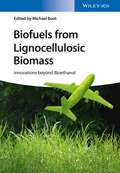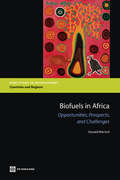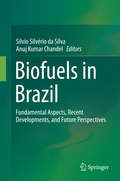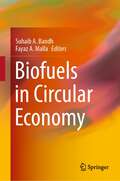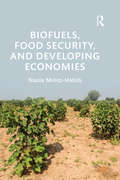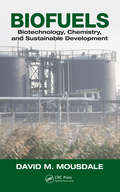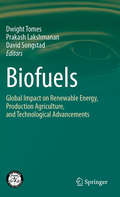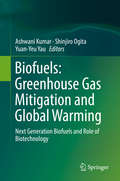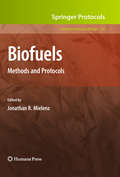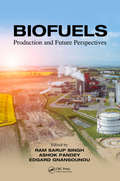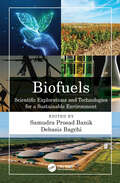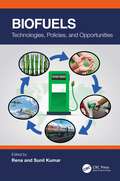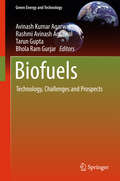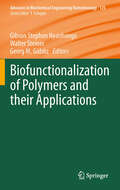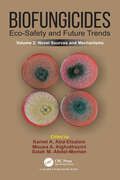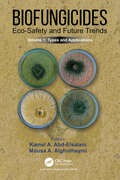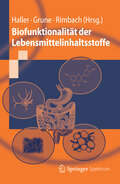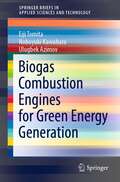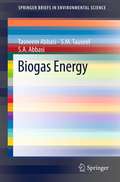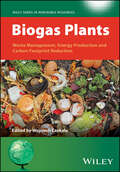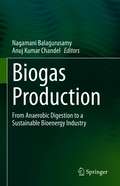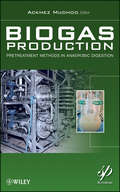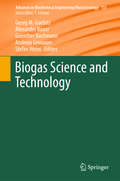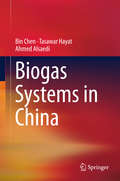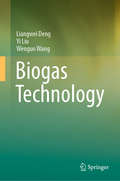- Table View
- List View
Biofuels from Lignocellulosic Biomass: Innovations beyond Bioethanol
by Michael BootWritten by experts in combustion technology, this is a unique and refreshing perspective on the current biofuel discussion, presenting the latest research in this important field. The emphasis throughout this reference is on applications, industrial perspectives and economics, focusing on new classes of biofuels such as butanols, levulinates, benzenoids and others. Clearly structured, each chapter presents a new class of biofuel and discusses such topics as production pathways, fuel properties and its impact on engines. The result is a fascinating, user-oriented overview of new classes of biofuels beyond bioethanol.
Biofuels in Africa
by Donald Donald MitchellA new economic opportunity for sub-Saharan Africa is looming large: biofuel production. Rapidly rising energy prices are expected to remain high for an extended period of time because of the increasing demand in prospering and populous countries such as China and India, the depletion of easily accessible supplies of crude oil, and concern over global climate change. As a result, there is renewed interest in biofuels as an alternative to fossil fuels. Africa is uniquely positioned to produce these new cash crops for both domestic use and export. The region has abundant land resources and preferential access to protected markets with higher-than-world-market prices. The rapid growth in the demand for transport fuels in Africa and high fuel prices create domestic markets for biofuels. The European Union and the United States have approved legislation that requires large increases in the consumption of biofuels over at least the next decade. Imports are expected to be needed to meet these mandates, thus opening the door to African and other developing countries that can produce biofuels or feedstocks for biofuels competitively. Expanding the production of crops for biofuels will affect the entire rural sector in Africa as resources are shifted away from traditional crops and the prices of all agricultural commodities rise. Even smallholders can participate in producing biofuel crops. To promote the sustainability and significant contribution of this enterprise, Biofuels in Africa provides guidance in formulating suitable policy regimes, which are based on protecting the rights of current land users, developing revenue-sharing schemes with local communities, safeguarding the environment and biodiversity, expanding institutional capacity, formulating new regulations and procedures, and emulating best practices from experienced countries. This volume will be of value to anyone interested in biofuels, including policy makers, development practitioners, private investors, researchers, and the general public. Now that African countries are trying to significantly increase their energy supply systems, biofuels are an attractive option using both dedicated crops and agricultural waste. This book provides guidance for them to develop a suitable policy regime for a significant contribution by biofuels. -Professor Ogunlade R. Davidson, Minister of Energy and Water Resources, Sierra Leone Biofuels in Africa is a sorely needed resource for our understanding of the problems of expanding biofuels production in Africa. A high point of the book is a description of the projects that were started in several countries. A very useful book! -Professor José Goldemberg, University of São Paulo, Brazil As Africa most likely will play the same role for global biofuels as the Middle East does for oil, this comprehensive book on African biofuels should be compulsory reading for anyone interested in either African development or biofuels. The book captures the essence of long-term drivers and opportunities as well the complex challenges for investors and society of this huge emerging industry. -Per Carstedt, Executive Chairman, EcoEnergy Africa
Biofuels in Brazil: Fundamental Aspects, Recent Developments, and Future Perspectives
by Anuj Kumar Chandel Silvio Silvério SilvaThis book discusses the commercialization of biofuels and the Brazilian government policies for the promotion of renewable energy program in Brazil, which could be a learning module for several countries for implementing biofuels policy to improve their socioeconomic status and make them energy independent. Researchers in academia and industries, policy makers, and economic analysts will be assisted by important source of information in their ongoing research and future perspectives. This book will benefit graduate and postgraduate students of chemical and biochemical engineering, forestry, microbiology, biochemistry, biotechnology, applied chemistry, environmental science, sustainable energy, and biotech business disciplines by signifying the applied aspects of bioenergy production from various natural sources and their implications. Graduate and postgraduate students as well as postdoctoral researchers will find clear concepts of feedstock analysis, feedstock degradation, microbial fermentation, genetic engineering, renewable energy generation and storage, climate changes, and techno-economic analysis of biofuels production technologies.
Biofuels in Circular Economy
by Suhaib A. Bandh Fayaz A. MallaThis book provides a detailed coverage of how the circular economy aims to change the paradigm in relation to the linear economy, by limiting the environmental impact and waste of resources, as well as increasing efficiency at all stages of the product economy. It serves as the sole comprehensive overview of the role of biofuels in the circular economy. It contains updated information on the latest trends of techno-economic analysis of biofuels, economic transitions, low-carbon economies, green circular societies, and life cycle assessment of biofuels. This book delves deep into the economic security of the poor as well as the nexus between biofuel industry and global trade bodies, making it one of the few introductory books without bias toward the contribution of biofuels in circular economy. With its diverse contributions on themes such as biofuels as potential alternatives to fossil fuels, biofuel economics and policies; biofuel standards, blending, and future insecurities; economic transitions from biomass to biofuels; and biofuel economy, development, and food security, the book would be a great resource for a wide and multi-disciplinary readership base ranging from researchers to academics, policy makers, innovators, corporates, and non-profit organizations working in this area.
Biofuels, Food Security, and Developing Economies (Routledge Studies in Bioenergy)
by Nazia Mintz-HabibThe last decade has witnessed major crises in both food and energy security across the world. One response to the challenges of climate change and energy supply has been the development of crops to be used for biofuels. But, as this book shows, this can divert agricultural land from food production to energy crops, thus affecting food security, particularly in less developed countries. The author analyses the extent to which biofuels feedstocks fit within the national food security strategy, agro-export orientation, and rural development plans and policies of developing economies. Two case studies, from Tanzania in East Africa and Borneo in Malaysia, are considered in detail, using the non-edible crop of jatropha as an example of how compromises can be reached to balance food and energy goals as well as export markets. The author develops a novel integrated approach, the Institutional Feasibility Study, as the basis of her analysis. She addresses key issues such as: how do global initiatives for green growth, energy security and sustainable development incorporate biofuels industry development? Does global biofuels trade present meaningful foreign and local investment opportunities for developing countries? To what extent does biofuels feedstock production help with poverty reduction and agricultural sector modernization? What role do the EU and the US commitments to biofuels blending targets play in the rapid industry development in developing countries? How does the biofuels industry fit within existing formal and informal institutional frameworks? Who are the winners and losers in the biofuels global value chain?
Biofuels: Biotechnology, Chemistry, and Sustainable Development
by David M. MousdaleEvaluating a wealth of quantitative data, Biofuels: Biotechnology, Chemistry, and Sustainable Development discusses different types of biofuels, the science behind their production, the economics of their introduction to the marketplace, their environmental impacts, and their implications for world agriculture. It broadens the discussion on biofuel
Biofuels: Global Impact on Renewable Energy, Production Agriculture, and Technological Advancements
by Prakash Lakshmanan Dwight Tomes David SongstadThis comprehensive volume developed under the guidance of guest editors Prakash Lakshmanan and David Songstad features broad coverage of the topic of biofuels and its significance to the economy and to agriculture. These chapters were first published by In Vitro Cellular and Developmental Biology In Vitro Plant in 2009 and consists of 15 chapters from experts who are recognized both for their scientific accomplishments and global perspective in their assigned topics.
Biofuels: Greenhouse Gas Mitigation and Global Warming
by Ashwani Kumar Shinjiro Ogita Yuan-Yeu YauThis timely book is a compilation of edited articles by distinguished international scientists discussing global warming, its causes as well as present and future solutions. Social and economic growth at global level is measured in terms of GDP, which requires energy inputs generally based on fossil fuel resources. These, however, are major contributors to increasing levels of CO2, causing 15 tonnes of green house gas emissions per capita. Renewable sources of energy offer an alternative to fossil fuels, and would help reduce this to the 2 tonnes of greenhouse gas emissions per capita per annum needed to achieve sustainable growth. As such, the book discusses the next-generation of biofuels and all related aspects, based on the editors’ significant investigations on biofuels over the last 30 years. It also presents the latest research findings from research work carried out by contemporary researchers. Presenting global biofuel perspectives, it examines various issues related to sustainable development of biofuels in the contexts of agriculture, forestry, industry and economic growth. It covers the 1st to 4th generation biofuels, as well as the status of biofuel resources and their potential in carbon neutral economy. Offering a comprehensive, state-of-art overview of current and future biofuels at local and global levels, this book appeals to administrators, policy makers, universities and research institutions.
Biofuels: Methods and Protocols (Methods in Molecular Biology #581)
by Jonathan R. MielenzWith the dwindling supplies of fossil fuels and growing concerns regarding climate changes due to green house gasses from these fuels, public opinion has swung dramatically towards favoring the development of renewable energy sources. In Biofuels: Methods and Protocols, career-long experts explore a full range of methods for bioenergy covering important topics such as biomass production and delivery to the biorefinery, detailed biochemical characterization, as well as biotechnological techniques for converting plant matter into fuels and chemicals. Time is of the essence in this field, and this volume aims to provide direction and assistance to the growing cadre of researchers endeavoring to develop new sources of bioenergy with a solid, easy-to-use collection of tried-and-true methods which will save time and effort in the field and the laboratory. Written in the highly successful Methods in Molecular BiologyTM series format, chapters include brief introductions to their respective topics, lists of the necessary equipment, materials and reagents, step-by-step, readily reproducible field and laboratory protocols, and notes on troubleshooting and avoiding common pitfalls. Timely and authoritative, Biofuels: Methods and Protocols seeks to help scientists and engineers as they develop and optimize bioenergy technologies needed to drastically change the course of our energy future as soon as possible.
Biofuels: Production and Future Perspectives
by RAM SARUP SINGH, ASHOK PANDEY AND EDGARD GNANSOUNOUThis will be a comprehensive multi-contributed reference work, with the Editors being highly regarded alternative fuels experts from India and Switzerland. There will be a strong orientation toward production of biofuels covering such topics as biodiesel from renewable sources, biofuels from biomass, vegetable based feedstocks from biofuel production, global demand for biofuels and economic aspects of biofuel production. Book covers the latest advances in all product areas relative to biofuels. Discusses coverage of public opinion related to biofuels. Chapters will be authored by world class researchers and practitioners in various aspects of biofuels. Provides good comprehensive coverage of biofuels for algae. Presents extensive discussion of future prospects in biofuels.
Biofuels: Scientific Explorations and Technologies for a Sustainable Environment
by Debasis Bagchi Samudra Prosad BanikBiofuels are promising eco-friendly, renewable energy alternatives, simultaneously curbing the dependence on depleting fossil fuel reserves, reducing the global carbon footprint. However, there have been technological constraints deterring the global wide-scale adoption of biofuel. Biofuels: Scientific Explorations and Technologies for a Sustainable Environment presents a comprehensive analysis of different types of biofuels. Five sections provide detailed information on the history and discovery of biofuels, first-generation biofuels, second-generation biofuels, third-generation biofuels, and beyond, as well as prospects of biofuels as cleaner and greener alternatives.FEATURES Introduces the history of the origin of biofuels Narrates the evolution of biofuel raw material beyond generations, from food crops to plastic waste Explains the application of primary biofuel types: biodiesel, bioethanol, and biohydrogen Discusses the promises and prospects of biofuel for a cleaner, sustainable future Biofuels: Scientific Explorations and Technologies for a Sustainable Environment analyzes the promising future of biofuel technology and its judicious use to minimize dependency on fossil fuels. It is designed for academia, scientists, and researchers, as well as industrialists, environmentalists, biofuel technicians, R&D industries, and those from the petroleum industry.
Biofuels: Technologies, Policies, and Opportunities
by Sunil Kumar RenaOffering a comprehensive overview of biofuels and bioenergy systems, Biofuels: Technologies, Policies, and Opportunities describes advances in technologies and global policies around biofuels as a renewable energy source. It discusses the basics of biofuel and bioenergy systems and current status and potential challenges in developed and developing countries. The book also highlights the questions that should be asked, available options, and processes (conventional and advanced) to enhance biofuel production. Details how technological interventions can influence the operation of an effective bioenergy system. Presents information regarding renewable energy directives and global policies related to energy chains, energy models, market status, and appropriateness of technology selection for different generations of biofuel generation. Covers socio-economic aspects and techno-economic feasibility as well as a detailed life cycle simulations (LCS) approach, revealing the real constraints being faced in the biofuels sector. Helps bioenergy professionals to prepare a roadmap for day-to-day operations. Describes recent advances such as biohythane, advanced oxidation process, and nanocatalyzed pretreatment for biofuel generation from wastewater. Addresses the most commonly discussed issues in the biofuel sector and the rationales underpinning them. Written for professionals, academic researchers, decision makers, and policymakers in the biofuel sector, this book provides readers with a wide-ranging review of current research and developments in the respective field.
Biofuels: Technology, Challenges and Prospects (Green Energy and Technology)
by Avinash Kumar Agarwal Rashmi Avinash Agarwal Tarun Gupta Bhola Ram GurjarThis book is intended to serve as a compendium on the state-of-the-art research in the field of biofuels. The book includes chapters on different aspects of biofuels from renowned international experts in the field. The book looks at current research on all aspects of biofuels from raw materials to production techniques. It also includes chapters on analysis of performance of biofuels, particularly biodiesel, in engines. The book incorporates case studies that provide insights into the performance of biofuels in applications such as automotive engines and diesel generators. The contents of the book will be useful to graduate students and researchers working on all aspects of biofuels. The book will also be of use to professionals and policymakers interested in biofuels.
Biofunctionalization of Polymers and their Applications: Biofunctionalization Of Polymers And Their Applications (Advances in Biochemical Engineering/Biotechnology #125)
by Georg Gübitz Gibson Stephen Nyanhongo Walter SteinerChitin, Chitosan and Derivatives for Wound Healing and Tissue Engineering, by Antonio Francesko and Tzanko Tzanov Polyhydroxyalkanoates (PHA) and their Applications, by Guo-Qiang Chen.- Enzymatic Polymer Functionalisation: Advances in Laccase and Peroxidase Derived Lignocellulose Functional Polymers, by Gibson S. Nyanhongo, Tukayi Kudanga, Endry Nugroho Prasetyo and Georg M. Guebitz.- Lipases in Polymer Chemistry, by Bahar Yeniad, Hemantkumar Naik and Andreas Heise.- Enzymes for the Biofunctionalization of Poly(Ethylene Terephthalate), by Wolfgang Zimmermann and Susan Billig.- Biology of Human Hair: Know Your Hair to Control It, by Rita Araújo, Margarida Fernandes, Artur Cavaco-Paulo and Andreia Gomes.- Recombinamers: Combining Molecular Complexity with Diverse Bioactivities for Advanced Biomedical and Biotechnological Applications, by José Carlos Rodríguez-Cabello, María Pierna, Alicia Fernández-Colino, Carmen García-Arévalo and Francisco Javier Arias.- Biomimetic Materials for Medical Application Through Enzymatic Modification, by Piergiorgio Gentile, Valeria Chiono, Chiara Tonda-Turo, Susanna Sartori and Gianluca Ciardelli.- Supramolecular Polymers Based on Cyclodextrins for Drug and Gene Carrier Delivery, by Jia Jing Li, Feng Zhao and Jun Li.- Engineering Liposomes and Nanoparticles for Biological Targeting, by Rasmus I. Jølck, Lise N. Feldborg, Simon Andersen, S. Moein Moghimi and Thomas L. Andresen.-
Biofungicides: Novel Sources and Mechanisms, Volume 2
by Kamel A. Abd-Elsalam Mousa A. Alghuthaymi Salah M. Abdel-MomenThe current volume focuses on novel sources of biofungicides, primarily providing complete knowledge of microbial and phytochemical fungicides, studying antifungal activity mechanisms as well as their role in disease management in plants, and fungicide bioremediation. The use of biofungicides as eco-friendly alternative to typical synthetic fungicides is projected to play a significant role in organic farming in the future.Key Features: Discovers novel sources of biofungicides Describes the role of biofungicides in the control of plant diseases Studies antifungal activity mechanisms Explores how to survey and select promising biofungicides
Biofungicides: Types and Applications, Volume 1
by Kamel A. Abd-Elsalam Mousa A. AlghuthaymiThe current volume focuses on all the major concerns associated with the biofungicides and provides comprehensive knowledge of microbial and phytochemical fungicides, bioformulations, regulation as well as limitation of biofungicides, and their role in disease management in plants. The use of biofungicides as eco-friendly alternative to traditional synthetic fungicides is likely to play a major role in organic farming in the future.
Biofunktionalität der Lebensmittelinhaltsstoffe (Springer-Lehrbuch)
by Gerald Rimbach Tilman Grune Dirk HallerFunktionelle Lebensmittel wirken nachweisbar stärker positiv auf die menschliche Gesundheit als normale. Das erste Lehrbuch zum Thema behandelt systematisch die Organfunktionen des Körpers und zeigt die Methoden, mit denen eine präventive Wirkung nachgewiesen werden kann. "Steckbriefe" aller relevanten Klassen von Lebensmittelinhaltsstoffen und deren Wirksamkeit bieten einen guten Überblick. Ergänzt wird das mit Abbildungen und Themenboxen anschaulich gestaltete Nachschlagewerk für Studenten und Lebensmittelexperten durch zahlreiche Fallbeispiele.
Biogas Combustion Engines for Green Energy Generation (SpringerBriefs in Applied Sciences and Technology)
by Eiji Tomita Nobuyuki Kawahara Ulugbek AzimovThis book deals with the combustion and exhaust emissions of gas engines fueled with green biogas. Biogas is a mixture of gases, primarily consisting of methane and carbon dioxide. Biogas can be produced from raw materials such as agricultural waste, manure, municipal waste, plant material, sewage, food waste, etc. Biogas is considered to be a renewable source of energy. Therefore, it can contribute to the prevention of global warming.The biogas engine is used to co-generate electricity by operating engine and heat from hot exhaust gases. The energy source used very efficiently. Unlike other green energy sources such as wind and solar, biogas is readily available when needed.This book first describes the basics of biogas and its application to internal combustion engines. Next, it describes the engine system and the combustion phenomena in the engine cylinder. Engine technology continues to advance in spark ignition and dual-fuel engines to achieve higher thermal efficiency and lower harmful emissions. Several advanced combustion technologies are introduced to achieve higher thermal efficiency while avoiding knocking.
Biogas Energy (SpringerBriefs in Environmental Science #2)
by Tasneem Abbasi S. M. Tauseef S. A. AbbasiIn recent years, the importance of biogas energy has risen manifold and has become universal. This is due to the realization that biogas capture and utilization has great potential in controlling global warming. By capturing biogas wherever it is formed, we not only tap a source of clean energy, but we also prevent the escape of methane to the atmosphere. Given that methane has 25 times greater global warming potential than CO2, methane capture through biogas energy in this manner can contribute substantially towards global warming control.
Biogas Plants: Waste Management, Energy Production and Carbon Footprint Reduction (Wiley Series in Renewable Resource)
by Christian V. StevensComprehensive resource highlighting the global significance of biogas and reviewing the current status of biogas production. Biogas Plants presents an overview of biogas production, starting from the substrates (characteristics, pretreatment, and storage), addressing technical and technological aspects of fermentation processes, and covering the environmental and agricultural significance of obtained digestate. Written by a team of experts with extensive theoretical and practical experience in the areas of bio-waste, biogas plants, and reduction of greenhouse gas emissions, Biogas Plants discusses keys topics including: Anaerobic digestion, including discussion of substrates and products Advantages of biogas plants, with emphasis on their future potential for stable and controlled renewable energy Global significance of the biogas sector, including its importance in electro-energy system stabilization, biogas plants for energy storage, bio-waste utilization, and biomethane productionA thorough and complete resource on the subject, Biogas Plants will appeal to academic researchers and industry scientists and engineers working in the fields of biogas, bio-waste, bioenergy, renewable resources, waste management and carbon reduction, along with process engineers, environmental engineers, biotechnologists, and agricultural scientists. For more information on the Wiley Series in Renewable Resources, visit www.wiley.com/go/rrs
Biogas Production: From Anaerobic Digestion to a Sustainable Bioenergy Industry
by Anuj Kumar Chandel Nagamani BalagurusamyThis book focuses on biogas production by anaerobic digestion, which is the most popular bioenergy technology of today. Using anaerobic digestion for the production of biogas is a sustainable approach that simultaneously also allows the treatment of organic waste. The energy contained in the substrate is released in the form of biogas, which can be employed as a renewable fuel in diverse industrial sectors. Although biogas generation is considered an established process, it continues to evolve, e.g. by incorporating modifications and improvements to increase its efficiency and its downstream applications. The chapters of this book review the progress made related to feedstock, system configuration and operational conditions. It also addresses microbial pathways utilized, as well as storage, transportation and usage of biogas. This book is an up-to-date resource for scientists and students working on improving biogas production.
Biogas Production: Pretreatment Methods in Anaerobic Digestion
by Ackmez MudhooThis volume covers the most cutting-edge pretreatment processes being used and studied today for the production of biogas during anaerobic digestion processes using different feedstocks, in the most efficient and economical methods possible. As an increasingly important piece of the "energy pie," biogas and other biofuels are being used more and more around the world in every conceivable area of industry and could be a partial answer to the energy problem and the elimination of global warming.
Biogas Science and Technology (Advances in Biochemical Engineering/Biotechnology #151)
by Georg Gübitz Alexander Bauer Guenther Bochmann Andreas Gronauer Stefan WeissMichael Lebuhn, Stefan Weiß, Bernhard Munk, Georg M. Guebitz Microbiology and Molecular Biology Tools for Biogas Process Analysis, Diagnosis and Control Veronika Dollhofer, Sabine Marie Podmirseg, Tony Martin Callaghan, Gareth Wyn Griffith & Katerina Fliegerová Anaerobic Fungi and their Potential for Biogas Production Bianca Fröschle, Monika Heiermann, Michael Lebuhn, Ute Messelhäusser, Matthias Plöchl Hygiene and Sanitation in Biogas Plants Charles-David Dubé and Serge R. Guiot Direct Interspecies Electron Transfer in Anaerobic Digestion: A Review Simon K. -M. R. Rittmann A Critical Assessment of Microbiological Biogas to Biomethane Upgrading Systems Manfred Lübken, Pascal Kosse, Konrad Koch, Tito Gehring, Marc Wichern Influent Fractionation for Modeling Continuous Anaerobic Digestion Processes Fermoso, F. G, van Hullebusch, E. D, Guibaud, G, Collins, G, Svensson, B. H, Carliell-Marquet, C, Vink, J. P. M, Esposito, G, Frunzo, L Fate of Trace Metals in Anaerobic Digestion
Biogas Systems in China
by Ahmed Alsaedi Bin Chen Tasawar HayatThis book derives an explicit analytical pattern (or framework) that permits the examination and optimization of biogas production systems. It provides a concise overview of the current status of biogas and biogas coupled agricultural systems in China, and introduces evaluation methods for energy efficiency, environmental emissions, economic performance and sustainability assessment approaches. Based on empirical studies, it also explores future options for the system development by focusing on emissions mitigation, biogas energy efficiency and system sustainability. Systematic methods of life cycle assessment and thermodynamic analysis may provide new angles for biogas system evaluation. The system discussed is not only a biogas producer, but also a biogas-linked ecological agricultural system, which has the potential to broaden the applicable scopes of renewable energy and eco-agricultural management. The comprehensive, in-depth knowledge and experience presented provide new analytical approaches for researchers in relevant fields and shed light on the construction and operation of emerging anaerobic digestion and biogas industries. This book is a valuable resource for researchers focusing on biogas system modeling, project managers and policymakers.
Biogas Technology
by Yi Liu Liangwei Deng Wenguo WangThis book focuses on agricultural waste treatment and renewable energy production from the perspective of anaerobic digestion. It covers topics on anaerobic digestion processes and practices in various types of biogas plant construction and management and systematically addresses the principle and main features of three kinds of anaerobic digestion systems: household digesters, biogas septic tanks, and biogas plants. Instructive, informative and easy to understand, the book offers a valuable asset for researchers, technicians, graduate students and managerial personnel working in the areas of renewable energy, agricultural ecological engineering and the treatment and utilization of agricultural wastes.
